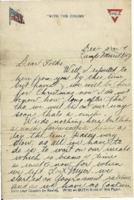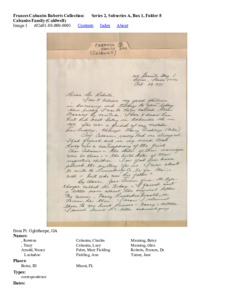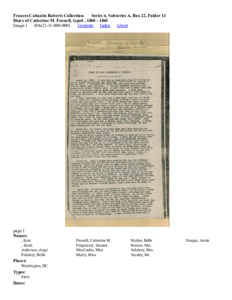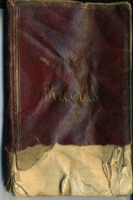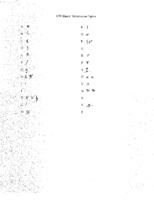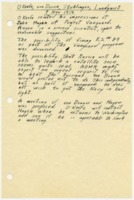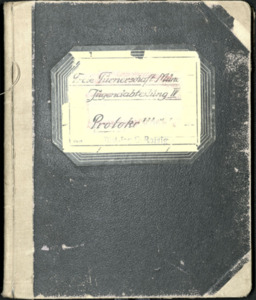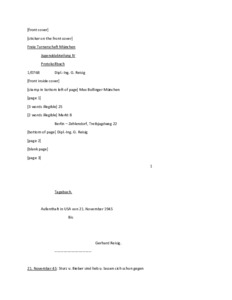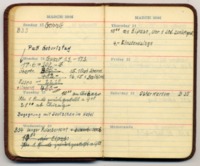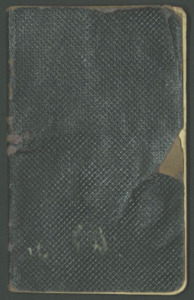
Browse Items (18 total)
Sort by:
-
World War I diary of Don Betsinger.
Betsinger served in the U.S. Army during World War I. Born on March 5, 1900, he was from Chicago, Illinois and enlisted as a private in the 12th Field Artillery in 1917. He embarked for France from Hoboken, New Jersey in early January 1918. The diary appears to include letters to his family and is missing many pages. The entries include opinions about the war, observations of fellow soldiers, and experiences in combat, including discussion of heavy shelling and mustard gas during the Battle of Belleau Wood in June 1918. Many of the descriptions are graphic in nature. Betsinger survived the war and later moved to Monte Vista, Colorado, where he operated the Triangle Tourist Camp in the 1940s. His wife, Elda Aden Betsinger, was a public school teacher. He died in San Diego, California in January 1980. -
Civil War diary of George Washington Harris.
Harris served as a private in Company F of the 149th Indiana Infantry Regiment, which occupied Decatur, Alabama in 1865. He enrolled at Terre Haute, Indiana, on February 15, 1865 at the age of twenty. Harris records his experiences as a soldier and traces his journey south to Decatur. Harris also describes his interactions with locals in North Alabama, writing in April 1865 that he "halted to talk with a family of Rebbs questioning concerning their so-called independence but found out nothing of importance Except that ther hopes had fled." He also includes descriptions of skirmishes in which he took part, as well as lengthy descriptions of the terrain and weather. Harris adds his comments on the assassination of Abraham Lincoln and writes down song lyrics and poetry at points. Harris was discharged on September 27, 1865. -
Transcript of the Civil War diary of George Washington Harris.
Harris served as a private in Company F of the 149th Indiana Infantry Regiment, which occupied Decatur, Alabama in 1865. He enrolled at Terre Haute, Indiana, on February 15, 1865 at the age of twenty. Harris records his experiences as a soldier and traces his journey south to Decatur. Harris was discharged on September 27, 1865. The transcription includes a key to the cipher that Harris sometimes used, as well as notes and clarifications in brackets and parentheses. Also included are the complete lyrics to the Union song "Reply to the Bonnie Blue Flag," part of which Harris records in an entry here. -
Excerpt from the journal of Charles A. Lundquist.
The entry describes a meeting during which Lundquist, Wernher von Braun, Ernst Stuhlinger, and John O'Keefe discuss the possibility of a Russian satellite launch and the U.S. Navy's Project Vanguard. -
1945-1946 Journal of Gerhard Reisig Dipl.-Ing.
Gerhard Reisig Dipl.-Ing., later Dr. Gerhard Reisig, was a German-American rocket scientist that worked on the team of von Braun at Fort Bliss. This journal covers his journey to the United States under Operation Paperclip, and includes descriptions of his experience to and through his arrival on December 6th, 1946. In this journal, he discusses numerous parts of his travel and experience in the United States including the rail route taken by the group he was in, reviews of two films of the time, comments on fashion and American society, as well as periodic mentions of food culture especially early in the journal. He additionally copies several articles by hand, some in English, some translated, from periodicals, particularly Time magazine. -
Transcript of 1945-1946 Journal of Gerhard Reisig Dipl.-Ing.
Gerhard Reisig Dipl.-Ing., later Dr. Gerhard Reisig, was a German-American rocket scientist that worked on the team of von Braun at Fort Bliss. This journal covers his journey to the United States under Operation Paperclip, and includes descriptions of his experience to and through his arrival on December 6th, 1946. In this journal, he discusses numerous parts of his travel and experience in the United States including the rail route taken by the group he was in, reviews of two films of the time, comments on fashion and American society, as well as periodic mentions of food culture especially early in the journal. The transcript includes links to copies of the articles he transcribed by hand if they could be found. -
Excerpt from the 1946 daybook of William A. Schulze.
This excerpt includes pages 36 and 37 of the daybook. In the entries, Schulze notes his travel to Fort Bliss, Texas from Aberdeen, Maryland. A translation is included. -
World War I diary of Archie Duncan Shannon.
Archie Shannon was a farmer who served in Company G of the 1st Pioneer Infantry in World War I. Shannon was born in Limestone County, Alabama on November 19, 1891, and at the time of his draft registration on June 5, 1917, he lived in Ardmore, Tennessee. Shannon reported for military duty on September 18, 1917 and entered training at Camp Pike, Arkansas.
This diary covers Shannon's experiences in the U.S. Army from July 1, 1918 to July 7, 1919. He describes his journey to France and details everyday life as a soldier, especially the discomforts of life on the front in both the Marne and Verdun sectors. Shannon discusses bathing and sleeping arrangements, gas masks, air raids, and the terrible sights of war-torn France while repairing roads and burying dead soldiers. Shannon includes descriptions of his involvement in the Meuse-Argonne Offensive, noting the continuous shelling, gas attacks, and miserable weather conditions. He also describes his company's reaction to the Armistice, writing, "Many happy hearts in our company everyone seems to take life anew."
Shannon spent the rest of his World War I service in Belgium, Luxembourg, and Germany, and he returned to the United States on July 7, 1919. A list of soldier names and hometowns is recorded in the back of the diary. Shannon died on May 20, 1969 and is buried in Gatlin Cemetery in Ardmore, Alabama.
